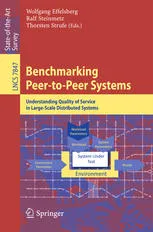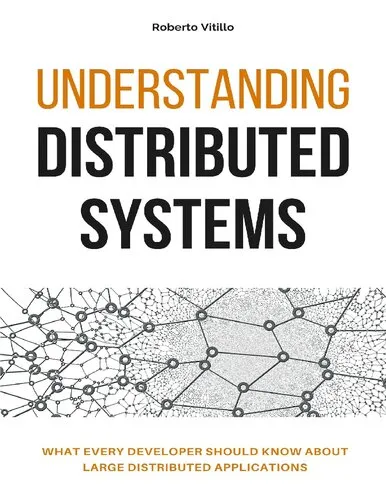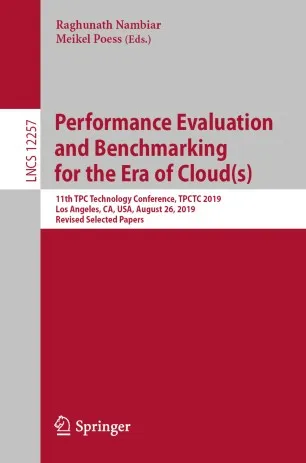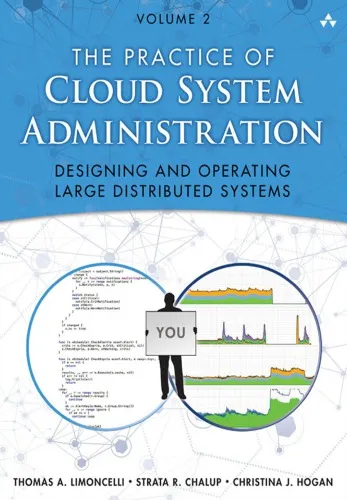Benchmarking Peer-to-Peer Systems: Understanding Quality of Service in Large-Scale Distributed Systems
4.0
Reviews from our users

You Can Ask your questions from this book's AI after Login
Each download or ask from book AI costs 2 points. To earn more free points, please visit the Points Guide Page and complete some valuable actions.Related Refrences:
Introduction
"Benchmarking Peer-to-Peer Systems: Understanding Quality of Service in Large-Scale Distributed Systems" is an insightful and comprehensive guide to understanding the challenges, methodologies, and techniques for evaluating Peer-to-Peer (P2P) systems. As these systems continue to grow in significance due to their scalability, resilience, and decentralized nature, their performance and reliability have become critical themes in the world of distributed computing. This book provides both a foundation and an advanced exploration of the key concepts, offering valuable knowledge for researchers, professionals, and students alike.
Written by leading experts Wolfgang Effelsberg, Ralf Steinmetz, and Max Lehn, and edited together with Thorsten Strufe, the book dives deeply into the Quality of Service (QoS) parameters critical to P2P systems. It explains how benchmarking such systems requires a unique methodological approach given their decentralized and large-scale nature. Through systematic chapters, the authors unpack frameworks, metrics, test environments, and evaluation processes required to fully understand the QoS characteristics of P2P architectures.
Summary of the Book
At its core, the book offers a multidimensional perspective on benchmarking P2P systems. The authors begin with an introduction to P2P technology itself, detailing its architecture, applications, and inherent challenges. The focus quickly shifts to benchmarking principles, where the need for meaningful evaluation criteria is established. The book defines critical QoS metrics such as availability, latency, throughput, fault tolerance, scalability, and fairness.
Following the definition of QoS parameters, the authors delve into testbed design to simulate P2P environments. They discuss both real-world and emulated environments, comparing their advantages and trade-offs. Readers will find a structured approach to creating benchmark suites tailored to specific P2P applications, whether for file sharing, content delivery, or distributed computations.
A significant portion of the book is devoted to practical use cases where benchmarking methodologies are applied. These examples illustrate the effects of design choices, environmental variations, and usage scenarios on system performance. The book concludes with insights into current trends and future challenges for P2P systems, cloaking technical advice in broader recommendations for developers and researchers.
Key Takeaways
- A thorough understanding of the foundational principles of P2P architectures.
- Comprehensive definitions of QoS parameters critical to evaluating distributed systems.
- Practical guidance on creating benchmarking environments and test suites.
- In-depth case studies illustrating real-world applications and performance challenges.
- Insights into the future trends of P2P technology and its potential impact on distributed computing.
Famous Quotes from the Book
"In distributed systems, achieving high performance is not merely a question of scale, but of fine-tuned coordination and fairness across all nodes."
"Benchmarking a peer-to-peer system is not about rigorously finding flaws; it’s about methodically unlocking its potential."
Why This Book Matters
Peer-to-Peer systems are already key drivers in areas such as content distribution, decentralized finance, and collaborative computing. As these technologies expand and intertwine with emerging paradigms like blockchain and Web3, understanding how to evaluate their performance becomes an even more vital aspect of their adoption. This book bridges the gap between high-level theory and practical implementation, equipping readers with the knowledge to enhance and refine P2P technologies for the future.
By focusing on QoS, the authors emphasize the aspects of distributed systems that users care about the most, including uptime, speed, and reliability. The book’s robust methodology can also inspire novel designs for new P2P applications, pushing the boundaries of what decentralized systems can achieve. Whether you are a seasoned engineer, a student delving into distributed systems for the first time, or an industry leader evaluating P2P solutions, this book offers indispensable guidance and cutting-edge insights.
Free Direct Download
You Can Download this book after Login
Accessing books through legal platforms and public libraries not only supports the rights of authors and publishers but also contributes to the sustainability of reading culture. Before downloading, please take a moment to consider these options.
Find this book on other platforms:
WorldCat helps you find books in libraries worldwide.
See ratings, reviews, and discussions on Goodreads.
Find and buy rare or used books on AbeBooks.
1310
بازدید4.0
امتیاز0
نظر98%
رضایتReviews:
4.0
Based on 0 users review
Questions & Answers
Ask questions about this book or help others by answering
No questions yet. Be the first to ask!













